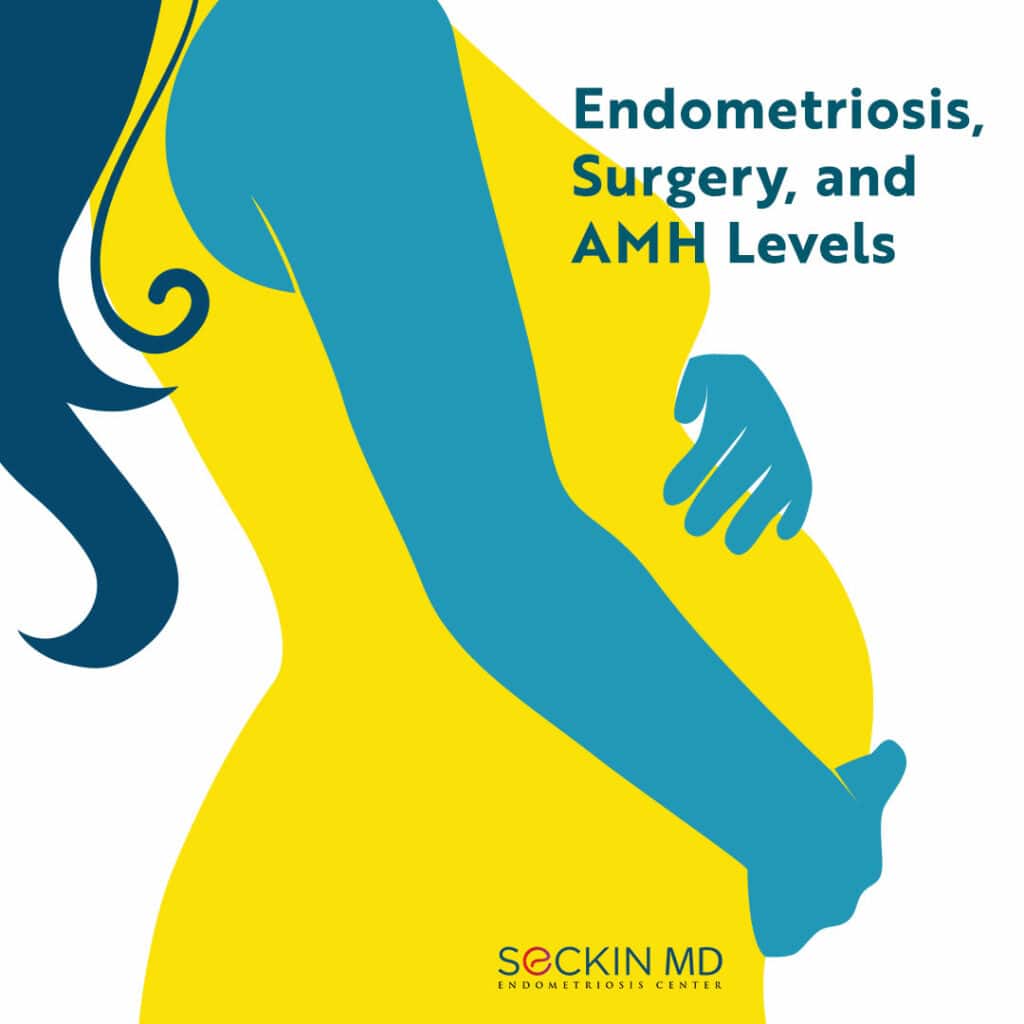Endometriosis, Surgery, and AMH Levels
Levels of anti-Müllerian hormone (AMH) give important clues about ovarian reserve and fertility. In endometriosis, AMH levels are usually low. But what is the effect of endometriosis surgery on AMH levels? Read on to find out.

What is AMH?
AMH is a hormone that plays different roles during embryonic development and during puberty. In the developing baby, high levels of AMH that the male gonads produce prevent the development of female sex organs. If the growing baby is genetically female, low levels of AMH allow the development of female sex organs.
In women, ovarian follicles smaller than 8 mm produce AMH. Therefore, the number of follicles in the ovaries, or ovarian reserve, is linked to levels of AMH in the blood. This peaks at age 25 and then slowly declines until menopause. The normal range for AMH is between 1 and 4 ng/mL. However, there are great differences in a woman’s AMH levels based on their age, ethnic background, way of life, and genetics.
How is an AMH test useful?
Assessing the levels of AMH in the blood is an important marker for fertility. It can help:
- Predict how well a woman would respond to assisted reproduction techniques (ART) such as in vitro fertilization (IVF)
- Corroborate other markers of menopause
- Lead to a diagnosis of conditions such as polycystic ovarian syndrome (PCOS), premature ovarian failure, and endometriosis
How does endometriosis affect AMH levels?
Infertility is a common result of endometriosis, touching nearly 50% of women with the disease. Reasons for infertility in endometriosis include inflammation in the reproductive tract, reduced blood supply near the ovaries due to scar tissue, and anatomical distortions in the pelvis.
Opposing reports exist on the impact of endometriomas (chocolate cysts) on ovarian reserve. But we know that the disease can affect both the structure and function of the ovaries.
Levels of AMH are significantly lower in women with endometriosis than in healthy individuals.
Does endometriosis surgery influence AMH levels?
Several studies have tried to understand how endometriosis surgery affects AMH levels and pregnancy.
A 2016 retrospective study compared 180 women with stage 3 and stage 4 endometriosis who have had surgery for ovarian endometrioma. These women had an intention to become pregnant and did so either naturally or via ART after the operation. The results showed that AMH levels before the operation did not have any impact on pregnancy rates after the procedure. The authors concluded that surgery should be recommended for women with severe endometriosis even if the AMH levels before the operation are below healthy values.
Laparoscopic cystectomy
Minimally invasive surgical removal of an endometrioma (laparoscopic cystectomy) is a widely used procedure to treat endometriomas. However, it has been associated with decreased ovarian reserve.
A 2019 open-label prospective study sought to determine the effect of laparoscopic endometrioma cystectomy on AMH levels in 171 women with varying stages of endometriosis, cyst size, and cyst laterality. The results showed that AMH levels were significantly lower after laparoscopic endometrioma cystectomy. This was especially the case in women with cysts on both sides larger than 7 cm and with stage 4 endometriosis. The drop in AMH levels in these patients lasted for more than a year. In others, the difference in AMH levels was not significant before and after the operation. The drop in AMH levels in these patients was particularly obvious at one, three, and six months after the operation. However, the levels became normal within 12 months meaning a recovery in ovarian reserves.
Laparoscopic endometriosis surgery
A literature review and meta-analysis of 19 studies done between 2010 and 2019 on the effect of laparoscopic endometriosis surgery on AMH levels after three and six months reported similar findings. The analysis inferred that there is a drop in AMH levels after laparoscopic endometriosis surgery that continues beyond six months. The effect is more obvious in laparoscopic surgery on both sides than just one side.
Another literature review recommends that AMH levels be invariably included during endometriosis diagnosis and pre-operative evaluation in reproductive women. The analysis also showed that endometrioma vaporization using a CO2 laser results in less AMH decline after the operation than cystectomy. However, for endometriomas greater than 5 cm, excision surgery had less impact on AMH levels after the procedure than vaporization or ablation. We must keep in mind that many practices use significant bipolar (electrical) energy with endometrioma cystectomy. This may cause a further decline of follicles, thus lowering AMH levels. Some use of electrical energy may be necessary to achieve hemostasis and reduce bleeding. But excess use could further reduce ovarian reserve.
How our approach beats the above limitations
At Seckin Endometriosis Center (SEC), we draw upon decades of experience in laparoscopic deep excision surgery and laparoscopic cystectomy. We fully core out the ovarian cysts and properly reconstruct the ovary without affecting its blood supply.
We also prefer a cold excision technique in order to preserve fertility as much as possible. The recurrence of an endometrioma further reduces ovarian reserves. We use a patented Aqua Blue Contrast (TM) technique to see and excise all endometriosis lesions. This can help prevent the disease to come back. There will be some inevitable loss of ovarian reserve following cystectomy. But our procedures ensure that as many healthy follicles as possible continue to grow and mature.
Are considering endometriosis surgery? Are you concerned about your AMH levels? Please share your thoughts on our posts on Facebook or Instagram.
Get a Second Opinion
Our endometriosis specialists are dedicated to providing patients with expert care. Whether you have been diagnosed or are looking to find a doctor, they are ready to help.Our office is located on 872 Fifth Avenue New York, NY 10065.
You may call us at (646) 960-3080 or have your case reviewed by clicking here.